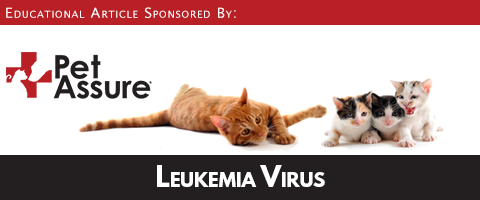Feline leukemia virus (FeLV) is a common viral disease in cats. It is the most common cause of cancer in cats and is usually fatal.
FeLV causes many diseases by invading and replicating inside the cells. This kills the cell or causes it to become cancerous. Some results from FeLV include:
- Cancer
- Suppression of the immune system: the infected cat can’t defend itself against many simple infections that would not be a problem in healthy cats
- Anemia
- Abortion
- Intestinal disease
- Neurological disease
- Eye disease
- Liver disease
CAUSES:
FeLV is more common when there are multiple cats in close contact, and in stray or outdoor cats.
An infected cat can transmit the FeLV virus through prolonged moist contact. For example:
- Saliva: mutual grooming, licking, biting, sharing dishes
- Nasal discharges
- Nursing
SIGNS:
- Lack of appetite and weight loss
- Vomiting and diarrhea
- Poor coat condition
- Swollen lymph nodes
- Fever
- Pale tongue and gums
DIAGNOSIS:
Your veterinarian will probably perform at least one of these tests:
- ELISA test: checks if your pet has the antibodies for FeLV
- Immunofluorescence: uses a fluorescent dye to illuminate viruses or their antibodies in body tissue (this test is usually performed to confirm the diagnosis if your cat tested positive with the ELISA test)
TREATMENT:
There is no cure to eradicate FeLV from the body, but your veterinarian will treat thesigns to relieve some discomfort:
- Medications: to stimulate your cat’s immune system
- Medications: to treat secondary infections
- Chemotherapy for cancer: extends survival to 6 months
- Blood transfusions
To prevent other secondary diseases:
- Feed your cat a healthy diet
- Give all recommended vaccinations and medications
- Keep a stress-free environment
- Keep your home sanitary
- Watch your cat’ssigns closely, and regularly follow-up with your veterinarian
PREVENTION:
You can manage the spread of the disease in an infected cat:
- Keep your infected cat indoors and away from other cats – this also protects your cat from other diseases they are susceptible to catching
- Spay or neuter your cats
To keep your cat from contracting the disease:
- Vaccination: not 100% effective
- Keep cats indoors and away from infected cats
- Do not allow your cat to roam
PROGNOSIS:
Typically, FeLV is fatal. However, cats that test positive for FeLV may live for months to years with good quality of life, depending on any secondary diseases.



